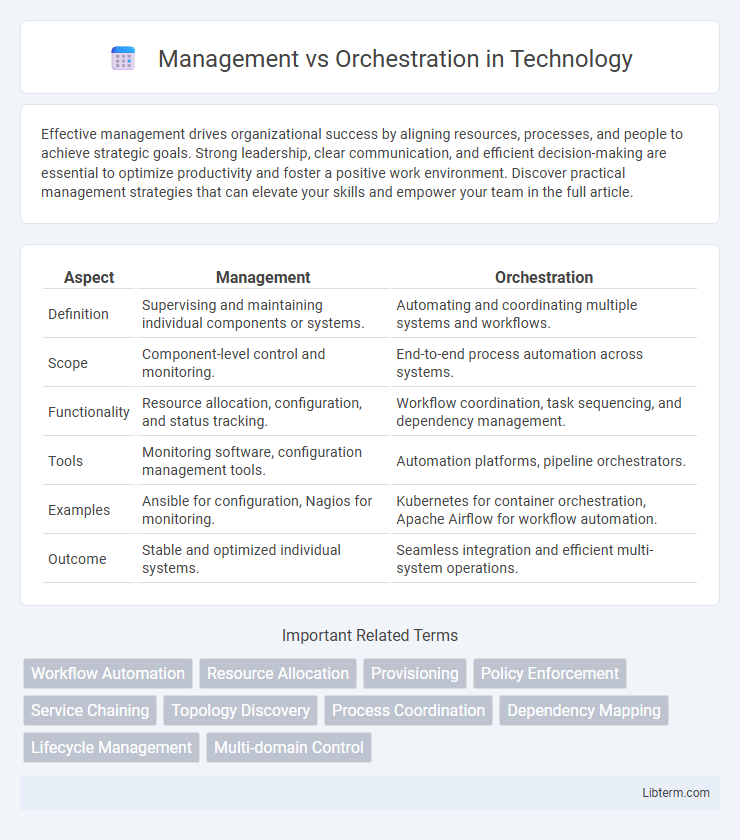Effective management drives organizational success by aligning resources, processes, and people to achieve strategic goals. Strong leadership, clear communication, and efficient decision-making are essential to optimize productivity and foster a positive work environment. Discover practical management strategies that can elevate your skills and empower your team in the full article.
Table of Comparison
| Aspect | Management | Orchestration |
|---|---|---|
| Definition | Supervising and maintaining individual components or systems. | Automating and coordinating multiple systems and workflows. |
| Scope | Component-level control and monitoring. | End-to-end process automation across systems. |
| Functionality | Resource allocation, configuration, and status tracking. | Workflow coordination, task sequencing, and dependency management. |
| Tools | Monitoring software, configuration management tools. | Automation platforms, pipeline orchestrators. |
| Examples | Ansible for configuration, Nagios for monitoring. | Kubernetes for container orchestration, Apache Airflow for workflow automation. |
| Outcome | Stable and optimized individual systems. | Seamless integration and efficient multi-system operations. |
Introduction to Management and Orchestration
Management involves overseeing and controlling individual IT resources, such as servers, storage, and networks, to ensure optimal performance and availability. Orchestration coordinates multiple automated tasks and workflows across these managed resources, enabling seamless integration and efficient service delivery. Together, management provides the foundational control mechanisms, while orchestration drives complex, end-to-end processes to meet business objectives.
Core Definitions: Management vs Orchestration
Management involves overseeing and controlling individual IT resources or services to ensure they operate efficiently and reliably. Orchestration coordinates multiple automated processes and systems to achieve complex workflows and business objectives seamlessly. While management focuses on single components, orchestration integrates diverse resources for end-to-end service delivery.
Key Differences Between Management and Orchestration
Management involves overseeing individual resources and ensuring their proper configuration, monitoring, and maintenance, while orchestration coordinates multiple automated tasks and workflows to achieve complex outcomes. Key differences include management's focus on resource-level control versus orchestration's emphasis on process-level automation and integration of diverse systems. Management typically operates at a micro level, ensuring components run smoothly, whereas orchestration functions at a macro level to streamline and optimize entire service lifecycles.
Roles and Responsibilities in IT Environments
Management in IT environments involves overseeing resources, monitoring system performance, and ensuring compliance with policies, focusing on administrative control and maintenance tasks. Orchestration automates the coordination and integration of complex workflows across multiple systems, emphasizing the dynamic provisioning and configuration of IT services. Roles in management typically include system administrators and IT managers, while orchestration tasks are handled by DevOps engineers and automation specialists who design and implement workflows for efficiency and scalability.
Architecture and Workflow Comparison
Management in system architecture focuses on configuring, monitoring, and maintaining individual resources or services to ensure optimal performance and availability. Orchestration involves coordinating multiple automated tasks across diverse systems, facilitating complex workflows for seamless integration and execution of interdependent processes. Workflow comparison highlights management as handling discrete operations, whereas orchestration manages the end-to-end flow, emphasizing scalability and dynamic resource allocation.
Automation: How Management and Orchestration Differ
Management involves the automated control and monitoring of individual systems or resources, ensuring configuration, provisioning, and maintenance tasks are executed efficiently. Orchestration automates the coordination and arrangement of multiple automated tasks and workflows across diverse systems to achieve a unified business process. While management focuses on individual components, orchestration integrates these components to deliver complex services seamlessly.
Use Cases for Management Tools
Management tools primarily focus on configuring, monitoring, and maintaining IT infrastructures, ensuring smooth operation of individual components such as servers, networks, and applications. Use cases include incident management, resource allocation, performance tracking, and compliance enforcement in enterprise environments. These tools enable IT teams to streamline routine administrative tasks and optimize operational efficiency.
Use Cases for Orchestration Tools
Orchestration tools excel in automating complex workflows that involve multiple systems, enabling seamless coordination across cloud environments, application deployment, and continuous integration/continuous deployment (CI/CD) pipelines. Use cases include managing containerized applications with Kubernetes, streamlining IT service provisioning, and automating business processes that require interaction between various software components. These tools provide real-time monitoring, policy enforcement, and scalable resource allocation, ensuring operational efficiency and reducing manual intervention compared to traditional management approaches.
Choosing the Right Approach: Factors to Consider
Choosing the right approach between management and orchestration depends on factors such as complexity of workflows, scale of operations, and automation requirements. Management focuses on overseeing individual components and resources, while orchestration integrates multiple services into coordinated, automated processes enhancing efficiency. Evaluating organizational goals, technology stack compatibility, and the need for real-time responsiveness is crucial to determine the optimal strategy.
Future Trends in Management and Orchestration
Future trends in management and orchestration emphasize automation through AI-driven systems that enable real-time decision-making and adaptive resource allocation. Edge computing integration and decentralized architectures will enhance scalability and reduce latency in managing complex distributed networks. Advances in container orchestration platforms like Kubernetes will focus on enhanced security, multi-cloud compatibility, and seamless integration with DevOps pipelines for more efficient infrastructure management.
Management Infographic

 libterm.com
libterm.com